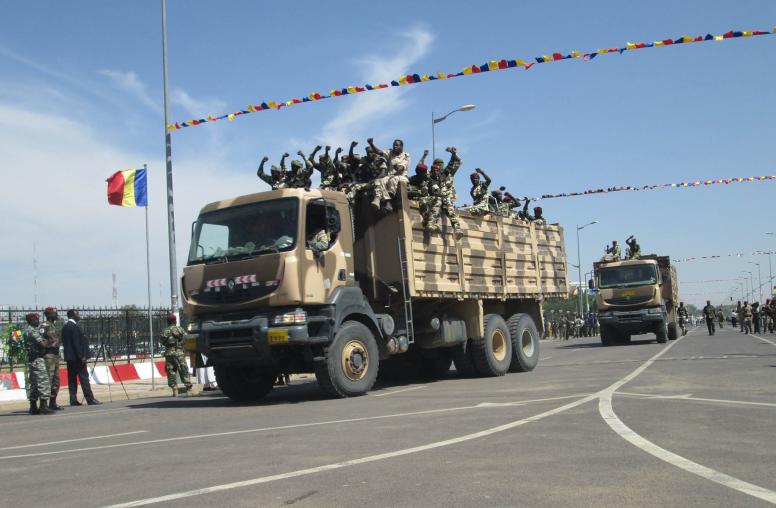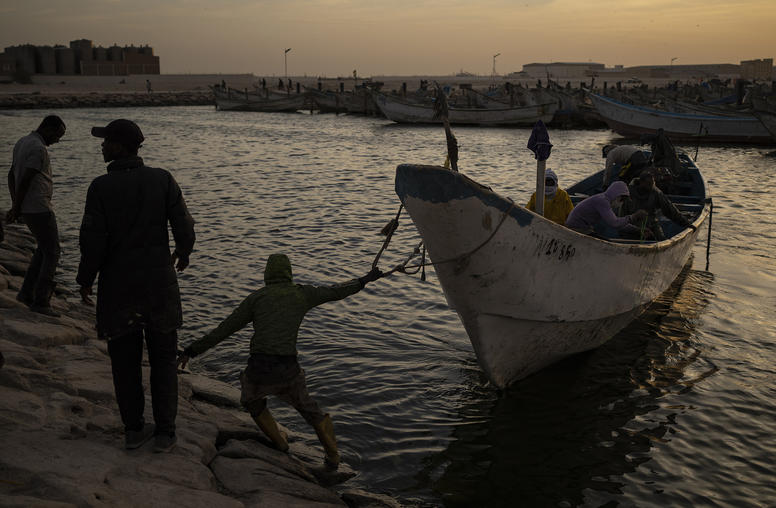Chad’s Delayed Transition is Frustrating Its Citizens
As national dialogue is delayed by negotiations with armed groups, tensions cloud the process.
On May 14, demonstrations against France’s influence in Chad turned violent, injuring several policemen and leading to damage at several French-owned gasoline stations in Chad’s capital city of N'Djamena. Wakit Tamaa, the civil society and opposition coalition that called for the demonstrations, had organized the event for participants to express their disapproval of French military influence in the country — including perceived French support for the Transitional Military Council (CMT) that has ruled the country since April 2021.

While the demonstrations do reflect genuine citizen frustration with French influence, they are also rooted in public frustration with the slow pace of the political transition that began when President Idriss Déby was killed on the battlefield in northern Chad in April 2021.
The Aftermath of Deby’s Death
In the days following Déby’s death, a group of military officers — led by Deby’s son Mahamat Idriss Déby — took control of the country, established the CMT and promulgated a transitional charter outlining the governing structure of an anticipated 18-month transitional period.
The CMT was immediately viewed as illegitimate by many Chadians, as it had not followed the constitutionally established procedures for succession following the death of the head of state. Protests broke out in the early months of the transition, some of which were met with violent repression.
The CMT succeeded in appeasing some Chadians by permitting slightly more public dissent than the previous regime and announcing an inclusive national dialogue. However, the country is now 15 months into the transition with only slow progress to show — leading to decreased public confidence in the transitional authorities.
Chad’s Long-Delayed National Dialogue
The national dialogue is one area where progress has been slower than originally envisioned. In August 2021, the Committee for Organization of the Inclusive National Dialogue (CODNI) was tasked with holding public consultations and issuing recommendations on the structure, participants and agenda of the eventual national dialogue. In parallel, the CMT made overtures to several of Chad’s most prominent rebel groups, including an offer of general amnesty for hundreds of rebels and dissidents. The CMT also nominated former President Goukouni Weddeye to lead a technical committee to conduct outreach to the rebel groups and secure their participation in the dialogue, a process that took several months.
As time went on, fears grew that the 18-month timeline for the transition would slip, especially since the national dialogue was meant to set in motion constitutional reform and a plan for elections, two other critical elements of the transition.
Ultimately, the outreach to rebels helped orchestrate a pre-dialogue that began on March 13 in Doha, Qatar, between 52 rebel groups and the Chadian government. A significant proportion of unarmed Chadians are supportive of rebel groups’ inclusion in the eventual national dialogue and the country’s future governance arrangements, so the announcement of the Doha pre-dialogue was broadly considered to be a positive step.
However, the pre-dialogue has lasted several months longer than expected. Originally scheduled for two weeks, the talks have not yet finished as of July 10. A final agreement from the pre-dialogue should be released in the coming days, but that is not certain.
An agreement has been unforthcoming due to divisions between the armed groups themselves on the one hand, and disagreements between the armed groups and the CMT on the other, on several issues: the ineligibility of transitional leaders to run in future elections; the revision of the composition of the CODNI and its rules; and the possible integration of civil society, the democratic opposition and the leaders of the rebellion in the CMT.
Broadly, the scope of the pre-dialogue has also been a source of concern among civil society in Chad. The pre-dialogue was intended to lead to an agreement on conditions for armed groups’ participation in the eventual national dialogue. However, the topics discussed have broadened significantly to include several items — such as the structure of the future state and the financing of the disarmament, demobilization and reintegration program — that citizens believed were intended to be discussed in the national dialogue in N’Djamena.
Meanwhile, on May 11 — two months after the start of the Doha pre-dialogue — the CODNI released its formal recommendations for the national dialogue. The document identifies agenda items and proposes a structure for the dialogue, including a general assembly, thematic commissions, an ad-hoc commission and a governing presidium that includes 15 members elected by consensus.
However, there was a notable omission: any mention of a process for selecting participants to the national dialogue. There are no recommendations offered on which groups should be represented, how many seats should be allotted to each group and how the participants will be selected. A lack of clarity for selecting participants likely means that the process will be highly contested — leading to further delays in the national dialogue and possibly pushing the transition beyond its original deadline of October 2022.
Creating Space for Citizens’ Voices
Ensuring that unarmed civilians’ voices are heard in the national dialogue is a critical step towards alleviating frustration and advancing a genuine transition, as is ensuring clarity around the national dialogue’s mandate, agenda, participants and implementation plan.
To help facilitate this, USIP partnered with the N’Djamena-based Center of Research for Anthropology and Social Sciences to convene workshops that objectively examine the transition and the preparations for the national dialogue and make recommendations. The workshop participants, who hailed from N’Djamena and six other provinces, included leaders of civil society associations, women’s associations, youth associations, disabled persons, representatives of the Bar association, academics, journalists, writers, artists and cultural figures.
Over five days, the group identified the key challenges facing Chad, including the detrimental absence of a functioning judicial system in many parts of the country. Workshop participants also expressed frustration with what they perceived to be a pattern of the Chadian government, including the CMT, placing a higher priority on engaging with and responding to the demands of armed groups than on being responsive to the needs and perspectives of unarmed civilians.
Regarding the transition, participants emphasized that for the dialogue to succeed, it will need a neutral facilitator, an agreed upon agenda and a clear mechanism for selecting participants. They also raised concerns about how the decisions reached during the dialogue would be implemented following its conclusion. Although the dialogue has been declared sovereign by the Chadian transitional authorities, doubts exist about whether the dialogue’s outcomes will be implemented if they are not supported by the ruling CMT.
Chadians have exercised restraint during the first 15 months of the transition, but patience seems to be waning with the CMT and the slow process — particularly because the democratic reforms promised during the transition have been long desired by many citizens.
What the International Community Can Do
The United States and the international community certainly have a decisive role to play in the transition. Following the formal conclusion of the Doha pre-dialogue, the United States and the international community should encourage the Chadian government to move swiftly toward the inclusive national dialogue in N’Djamena, even if some armed groups decline to participate.
However, the United States should remain involved in the meantime. On July 1, U.S. Chargé d’Affairs Ellen Thorburn called on the CMT to honor its promise for the shortest possible transition and for CMT members to not run in post-transition elections. The call provoked a rebuke from the spokesperson of the Patriotic Salvation Movement — the political party associated with much of the Deby family and their closest allies — but was supported by the political opposition and civil society. This episode has brought to the fore the opposition’s skepticism about the neutrality of the CMT.
The international community should also support, as necessary, a neutral Chadian figure to broker the inevitable negotiations between the government and other stakeholders on the composition of the participants in the national dialogue. Although the African Union’s reluctance to condemn the undemocratic transition has led to frustration among Chadian citizens, strong pressure by the AU could still be effective — both for the government to stick to the timeline of the transition and for all stakeholder groups to reach an agreement on who will participate in the national dialogue.
It is also important that the international community support Chadians as they agree to an implementation plan prior to the start of the inclusive national dialogue such that the dialogue’s outcomes are implemented and not lost in the transition period, as has happened in other national dialogues. International mediation may also be necessary around particularly thorny issues in the dialogue, including the question of whether CMT members can stand for future elections.
More and more signals are pointing towards an extension of the initial 18-month transition period, as it is very unlikely the remaining stages of the transition will be completed within the next four months. Such a shift would certainly be a source of increased tensions. Supporting timely progress and citizen participation in Chad’s transition is therefore of the utmost importance at this time to guard against further instability in a region where democracy has faltered significantly over the past two years.
Dr. Yamingué Betinbaye is a researcher at the Centre of Research in Anthropology and Human Sciences in N’Djamena Chad.



